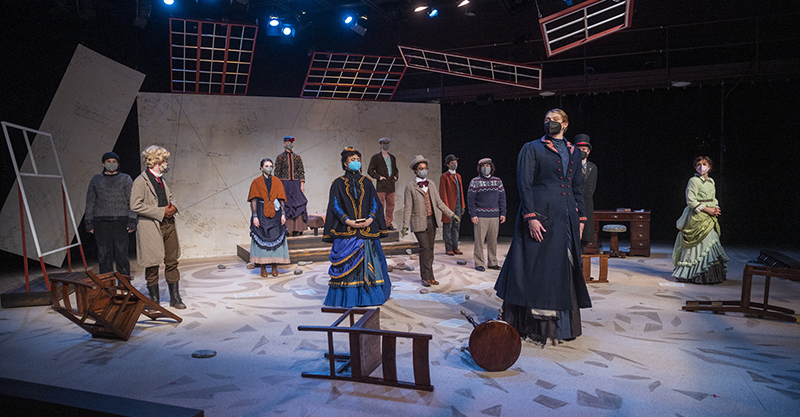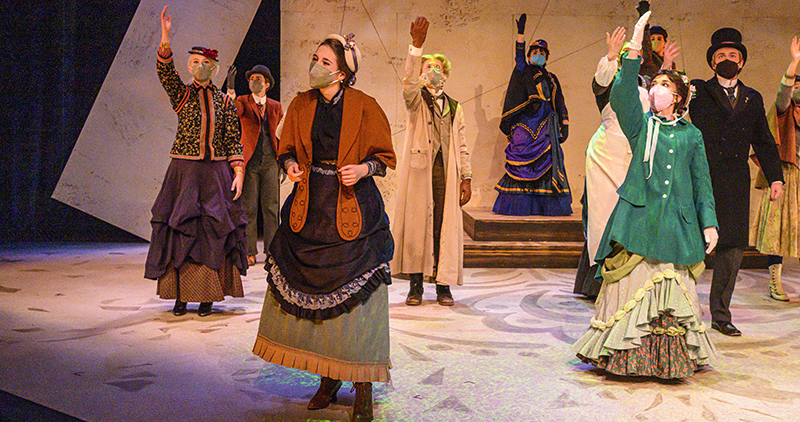Beautiful yet realistic projections on stage backdrops, captivating costumes that complement each character’s attitude and personality, and the beating of violins and drums that foreshadow the play’s core conflict—such pieces at the beginning of the play immediately immerse the audience in Bronnen, the town where the play takes place, and its people.
Genesee Spridco’s Varslaren (The Whistleblower) explores a painful present-day truth: the adulteration of truth and what it means when it is attacked by politics, propaganda, and, ultimately, a people unwilling to let go of their own preferences and opinions. Indeed, Dr. Therese Stockmann, the main character played by Greer Nicole Durham, symbolizes truth itself as she fights for the truth to be told and understood—the truth that the town’s famous baths contain polluted water that has slowly harmed the townspeople over time. Durham pulls the audience in with her performance that balances objectivity in Stockmann’s nature as the town’s medical expert trying to tell the facts and pure, released emotion in Stockmann’s defense and even outburst in response to the people’s eventual, unrelenting attacks on her and her daughter Petra, played by Sophia Pucillo.
Pucillo’s performance as Petra penetrates audience’s hearts as well. Petra’s youthful vivacity shines through her actions and words, and this is perhaps most present whenever she interacts with her mother Dr. Stockmann. However, Pucillo so vividly displays the fire and tenacity within Petra too when Petra defends her mother and calls out corruption and injustice in confrontations with those in power who seek to shadow the truth. “They have a right to know about the baths!” Petra exclaims in a direct address to the audience, referring to the townspeople. “It is our duty.”
Indeed, the first half of the play documents the buildup involving the discovery of the polluted water, Stockmann’s initial attempts to share and publish this discovery, doubt and the death of objectivity creeping into the townspeople, and the preparation for the debate and showdown occurring in the second half of the play. The intentional, effective utilization of projections amplify Stockmann’s explanation of the baths and the pollution it has undergone. At first, the water and bubbles projected onto the backdrops appear a regular blue, but the moment Stockmann mentions the word “infection,” they immediately turn a ghastly green, demonstrating the gravity of what Stockmann just said.
Doubt and the death of objectivity are sown by perhaps two of Stockmann’s biggest oppositions: Hovstad, the town newspaper’s editor played by Raiya Wen, and Peter, the town’s mayor and Stockmann’s own brother, played by Connor Kamradt. Wen’s and Kamradt’s performances as these individuals who explicitly challenge Stockmann work so well because Wen and Kamradt commit to the complexities of their characters. Peter, for most of the play, prioritizes his duty as powerful mayor over his duty as responsible, loving brother to Stockmann while Hovstad stays steadfast in her belief that the editor is “often obliged to bow to the wishes of the public,” leading to the convolution of the very truth that the press is supposed to uphold.

Photo by Darrell Hoemann.
It is interesting to note that Hovstad’s and Petra’s dresses are two of the costumes that pop out due to their prominent colors amidst the muted colors of the other characters’ costumes. Costume designer Hannah Haverkamp certainly lets her design prowess be known through the forest green overlaying Petra’s coat and pale green pervading her dress and the dark blue dominating the sharp dress of Hovstad decorated by pockets of yellow. With green commonly associated with nature, growth, and renewal, Petra’s symbolizing of survival and hope for her and her mother can be considered, and with blue usually connected with characteristics such as wisdom, freedom, and loyalty, the irony that Hovstad wears blue adds another layer to her character.
The debate and showdown between Stockmann and the townspeople comprise most of the play’s second half that takes place in the home of Captain Horster, perhaps Stockmann’s sole supporter from the townsfolk, who is played by Bree Kazinski. It would be a disservice not to mention how the layout of the Studio Theatre is optimized to fully engage the audience in this scene.
Studio Theatre utilizes a “black box” theatre style that provides flexibility for various seating configurations. For Varslaren, the seats are situated against two walls forming a perpendicular, angling the audience toward the center. Before the debate/showdown scene, chairs are brought out for the townspeople and are situated in the center in a similar format to the actual seats of Studio Theatre. This may appear a minor detail, but when Stockmann starts presenting to the townspeople, audiences may note how she gravitates in their direction too. It is as if she is presenting to the audiences as well, making them characters in the play and influencing them to consider and even confront what they believe is true compared to what is actual truth. It is a layout detail that may be brushed over quickly but one that proves compelling in furthering the play’s message.
This scene culminates in the townspeople creating chaos in response to Stockmann, soon naming her “an enemy of the people,” referencing the title of Henrik Ibsen’s 1882 play on which Varslaren is based. The phrase has the potential to echo in the minds of audiences as truth and enemy have become so synonymous in the ways people have approached and treated the pandemic. To put it another way, the phrase reminds us of the current world in which we live and the duty and responsibility we have to fight for truth, even when it is most difficult.
Varslaren (The Whistleblower)
February 11th-18th, 7:30 p.m.
February 19th, 2-4 p.m.
Krannert Center for the Performing Arts
500 S Goodwin, Urbana
Tickets: $10-$50, order online.
Contains adult content.








